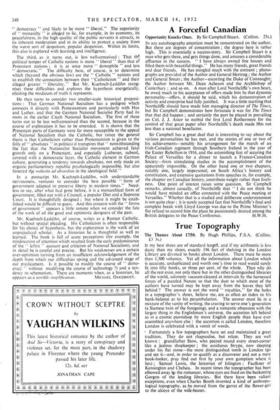A Forceful Canadian
Opportunity Knocks Once. By Sir Campbell Stuart. (Collins. 25s.)
IN any autobiography attention must be concentrated on the author. But there are degrees of concentration ; the degree here is rather high. This is essentially a success-story. Sir Campbell Stuart is a man who gets there, and gets things done, and amasses a considerable affluence in the success. " I have always owned fine houses and filled them with beautiful things." He has many friends, great friends and dear friends. He has mingled much with the eminent ; photo- graphs are provided of the Author and General Hertzog ; the Author and General Smuts ; the Author—escorting the Duke of Connaught; the Author between Mr. Dean Acheson and the Archbishop of Canterbury ; and so on. A man after Lord Northcliffe's own heart, he owed much to his acceptance of offers made him by that dynamic personality—offers, it should be said, which his demonstration of activity and enterprise had fully justified. It was a little startling that Northcliffe should have made him managing director of The Times, but Sir Campbell demonstrates how fortunate it was for The Times that that did happen ; and certainly the part he played in prevailing on Col. J. J. Astor to outbid the first Lord Rothermere for the control of that great paper after Northcliffe's death made him not less than a national benefactor.
Sir Campbell has a great deal that is interesting to say about the various personalities he has met, and the stories of one or two of= his achievements—notably his arrangement for the march of an. Irish-Canadian regiment through Southern Ireland in the year of the Easter Rebellion in 1916, and the astonishing feat of securing the Palace of Versailles for a dinner to launch a Franco-Canadian Society—form stimulating studies in the accomplishment of the apparently impossible. On the other hand one or two chapters, notably one, largely impersonal, on South Africa's history and constitution, and extensive quotations from speeches in, for example, the chapter on Canadian history, contribute weight rather than liveli- ness. One point of interest raises some question. Sir Campbell remarks, almost casually, of Northcliffe that " I do not think he would have minded an office connected with the Peace meeting at Versailles." Whether that is a studied and deliberate understatement is not quite clear ; it is surely accepted fact that Northcliffe's final and complete break with Lloyd George was due to the Prime Minister's flat refusal to accord him the place he passionately desired among the
British delegates to the Peace Conference. H.W.H.










































 Previous page
Previous page